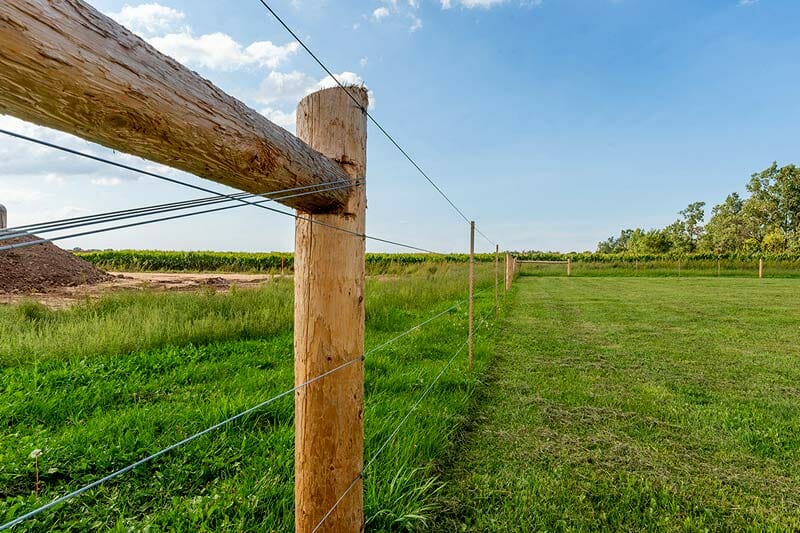Setting up a fencing system for agricultural activities to confine livestock is essential and provides significant benefits by ensuring that your farm animals remain within a designated area.
In having a fence to help contain and safeguard your livestock, you can expect to spend between $1 to $8 per linear foot. This estimated cost can differ depending on the type of fence, the size of the project, the height, and others.
In selecting the type of fence that you want to have installed, you should first consider the kind of livestock you are keeping, the quality that you want, and the purposes that you want your fence to be of use for.
What we cover
ToggleTypes of livestock fencing and their costs
High-tensile fencing
One of the most effective and worthwhile fencing types.
The best option for livestock because of its robust characteristics, and construction design.
Is relatively easy to install, but would require multiple strands to properly secure your perimeter.
| High-tensile wire type | Average cost range |
|---|---|
| High-Tensile Wire (Non-Electric) | $0.02 - $0.03 per strand |
| High-Tensile Bare Wire (Electric) | $0.03 - $0.12 per strand |
| High-Tensile Barbed Wire | $0.03 - $0.05 per strand |
| Electric High-Tensile Polymer | $0.10 - $0.15 per line |
| High-Tensile Polymer Rail | $0.80 - $0.90 |
| High-Tensile Polymer (Non-Electric) | $0.11 - $0.13 per line |
Barbed wire fence
Commonly used for keeping livestock and cattle in a provided area, this type of fence is typically made of steel, with sharp and pointed wires sticking out for added security.
Intruders, animals, or predators are repelled by the barbs that can cause injury. This also adds another layer of security for those who attempt to break or pass through the wire.
For barbed wire fences, there are two types: security and livestock.
For reference, below are the average prices for barbed wire fences:
| Description | Average Cost |
|---|---|
| Barbed Wire Fence per foot (Livestock) | $1.25 to $3.50 per foot |
| Barbed Wire Fence per foot (Security/Razor) | $1 to $3 per foot |
| Barbed Wire (Construction) 5 strands 12-gauge For a 1,300-foot fence | $1,900 |
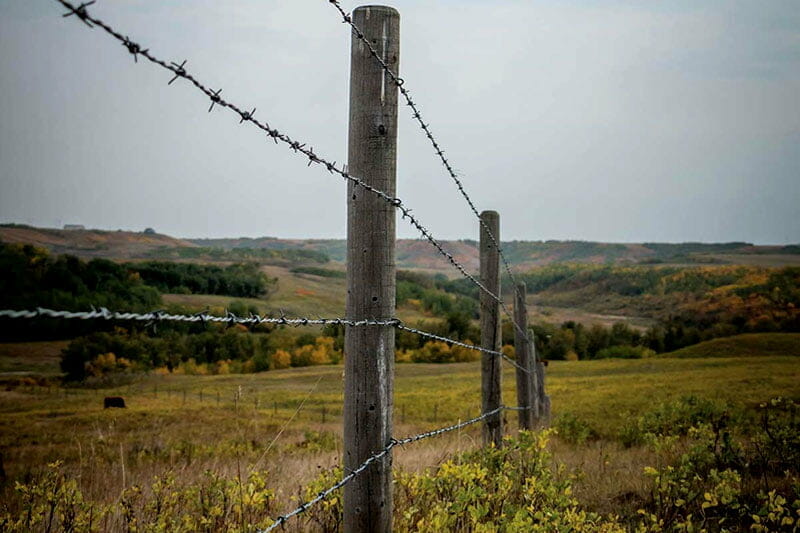
Chain link wire fence
Is usually paired with barbed wire fencing for optimum effectiveness and security. However, for those who don’t want the risk of injuring their livestock, it can also act as a standalone fence.
Cost-friendly and lightweight, yet strong enough to create an effective boundary marker for properties, residential markers, pet spaces, and small livestock.
For reference, below are the average prices for chain link wire fences:
| Description | Average Cost per linear foot |
|---|---|
| Chain Link Fence (4ft height) | $7 to $12 |
| Additional Height | $1 to $2 |
| Additional Privacy Slats | $3 to $5 |
| Additional Fabric Screen | $3 |
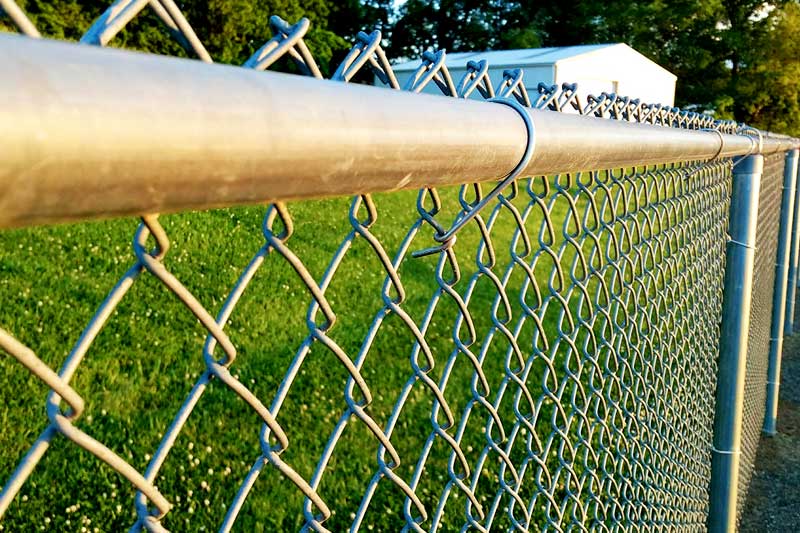
Chicken wire fence
Chicken wire fences are commonly used for their flexible, strong, and durable characteristics.
Named after its most common purpose, chicken wire fences are also used to keep squirrels, rabbits, mice, and other small animals contained safely in a specific area..
The average cost to install a chicken wire fence can range between $2 to $4.50 per linear foot.
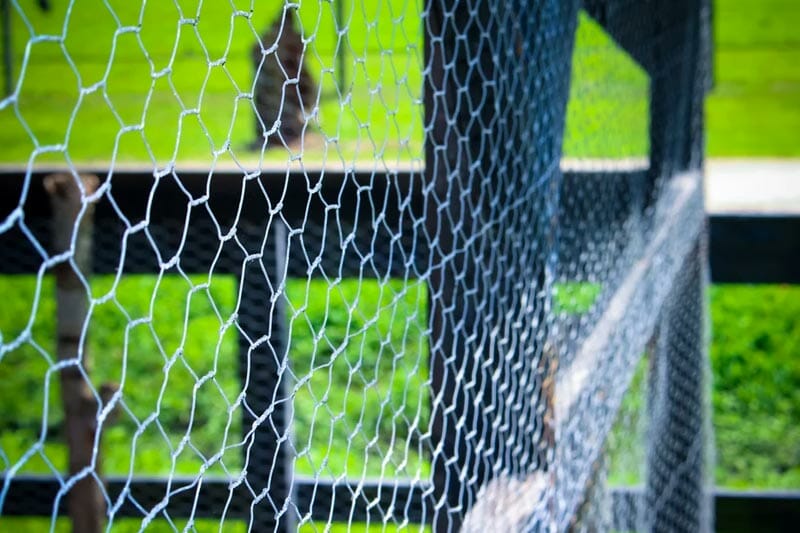
Horse fencing
This type of livestock fencing also has various styles, and a variety of materials that you can choose from such as metal pipes, classic split rail wood, or even electric.
The cost to install a horse fence can include multiple factors such as the size of the field needing to be fenced, the selection of materials, labor costs, and the height of the fence.
The cost to install a horse fence can run between the ballpark range of $3.70 to $30 per linear foot. Normally, installing a horse fence for a 100-linear feet area can run between $1,500 to $3,200.
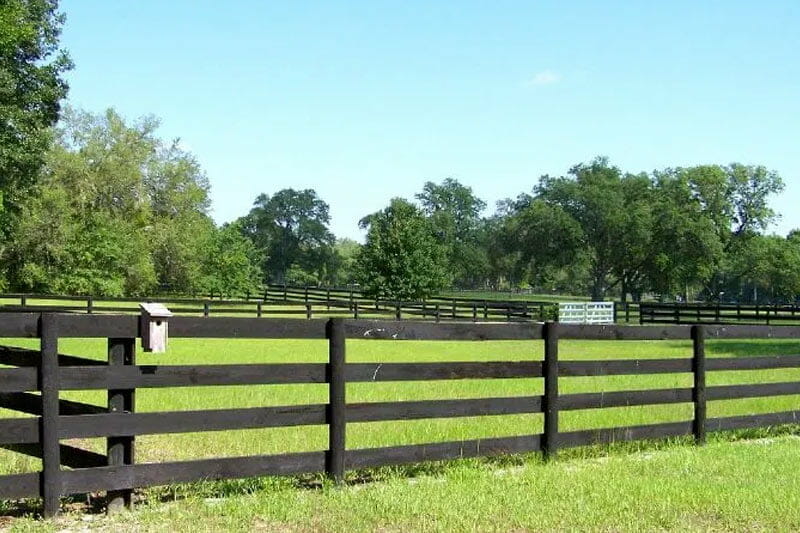
Woven wire fence
Also known as “page wire” or “sheep fencing”, a woven wire fence is made of wire nets of lightweight horizontal and vertical wire that are intersected with one another.
Typically, this wire is stretched and attached to opposite fence posts to enclose a given area.
For optimum security, property owners often pair this fence type with barbs at the top as a way of increasing its effectiveness.
For reference, below is the average cost for installing a woven wire fence:
| Description | Average Cost |
|---|---|
| Woven Wire Fence | $1.48 to $1.85 per linear foot |
| Woven Wire Fence 100 feet long; 5 feet height 2” x 4” mesh | $180 per roll |
| Woven Wire (4ft by 300ft) 330 feet length; 4 feet height 6” by 6” mesh | $189 per roll |
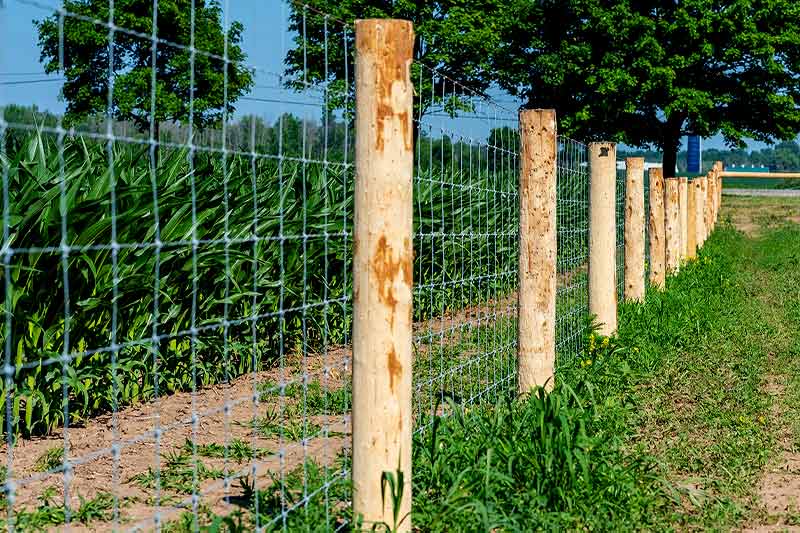
Fence post cost for livestock fencing
Normally, for any fence to be effective and efficient, they need to be attached to sturdy and reliable posts.
When it comes to installing a livestock fence, the charge for the posts is typically part of the total expense of the fencing project. Although this may be applicable in bulk projects, you may have to pay for them individually in some situations.
For instance, if you only need to repair, or replace a damaged fence post, or if you deem extending your fenced property, you may only need to purchase it individually as additional material.
You can spend somewhere between $20 to $60 to purchase a fence post, including the cost of its installation. The factors that can affect the cost can differ based on the type of the fence, the material of the fence, and its height.
To help you choose the type of fence post that best serves your type of livestock fence, below are two of the widely used variations:
Wood fence post
Wooden fence posts come in different kinds and thicknesses, which can be used for various types of fences.
Some wooden fence posts can be installed with decorative elements for added visual appeal.
For fences that use wooden frames, pairing it with this type of fence post adds a visual coherence, and can be visually pleasing.
The average cost for a wooden fence post is around $20 to $50 per post.
Metal fence post
Depending on the required foundation of your chosen fence type, there is a variety of metal fence posts that you can choose. These variations differ from thinner rods to more solid, robust pieces.
For lightweight fencing, thinner metal posts are more appropriate and sufficient.
For heavy and stronger fences, thick and sturdier fence posts are required and are suitable.
Typically, metal posts can be more durable compared to its counterparts. Additionally, metal posts require less maintenance and upkeep.
While they may be more durable, metal fence posts can be less appealing compared to wooden fence posts. However, decorative elements can still be attached to it.
The average cost for a metal fence can run between $25 to $60 each.
Other types of livestock fencing and their characteristics
Most of the time, property owners who keep livestock prefer a certain type of fencing to help protect and keep their animals and agriculture. Normally, a single type of fence is not a one-shoe-fits-all since each serves a specific purpose.
Typically, it can be tricky to keep sheep, goats, pigs, and poultry in a given space since they can easily climb over and crawl under certain types of fences. Luckily there are types of livestock fences that can solve this problem.
Below are some of the types of livestock fencing and their characteristics:
| Types of livestock fences | Characteristics |
|---|---|
| Hinge joint fence | Also referred to as farm fencing, this type has four wrap hinge joints that intertwine the wires. Has various height options to help keep different animals. Various horizontal wire spacing to allow various growth periods and tensile strength. Is best for safekeeping rabbits, cats, chickens, sheep, deers, and horses. |
| Fixed knot fence | This type combines the hinge joint with high tensile steel wire, which has stronger fabrics and can be installed faster with lesser use of fence posts. Comes in various height variations, which can cater to your livestock fencing needs, depending on the animal that you want to safe keep. Is ideal for safekeeping cattle, camels, horses, and deers. |
| High tensile wire fencing | This type of fencing makes use of highly robust, and high-tension wires that are not stretchable. With this, the wire prevents animals from passing and climbing through, since it cannot be easily bent or damaged. Utilizes lesser fence posts, and can be installed with wider spacing. While this type can be more on the costly side, high tensile wire fencing has a longer lifespan. |
| Chicken wire fence | Chicken wire adopts the characteristics of galvanized wire, stainless steel wire, and PVC coated wire. The result allows for an impressive anti-corrosion and durable fence wire. With steel wires that are woven into hexagon meshes, the chicken wire fence is a great choice for lightweight fencing. This type is ideal for keeping chickens, goose, rabbits, other small animals, and garden purposes. |
| Barbed wire fencing | Barbed wire fencing serves as highly effective for keeping docile livestock such as cattle. Its effectiveness comes from its construction where it repels animals or people away from the fence because of its pointed edges. This type is not advised for people who are keeping horses or camels who are at risk of running into the fence and causing themselves unwanted injuries. |
| Steel wire hex deer fence | Also called metal hex deer fencing, this type is metal coated with black PVC, allowing it to be the best deer fencing. It can offer less visible, more durable, and stronger deer fencing. This is best for property owners who keep deers who frequently damage fences from chewing, or for those who want to have better fencing. |
Labor cost to install a livestock fence
Typically, it would take a professional 1 to 3 days to finish a fence project. Although this may be a reliable estimate, the actual duration can still differ depending on factors such as the fence type, the size of the project, and other conditions.
If you hire a professional to install your livestock fence, you can expect to spend around $40 to $60 per hour. This estimated cost translates to $0.92 to $5 per foot in labor costs.
On top of the standard labor cost, another factor can contribute to the cost. For instance, if your terrain is uneven, you may be required to have it re-sloped. Availing of this necessary service can cost you an average of $1,300.
While it may be obvious that the total cost of your entire fencing project may balloon because of the labor costs, this investment will not be wasted.
Installing a livestock fence: DIY vs hiring a contractor
Having a livestock fence installed on your property can be quite taxing and difficult, especially if you are not used to working with heavy tools and extensive labor.
While hiring a professional can increase your total cost, this expense can come advantageous and necessary because you can assure that the person who is keeping your livestock safe is of experience and expertise.
Additionally, hiring a professional can assure you that your livestock fence is secure and professionally done, saving you the trouble of paying for any rework or repair in case the fence is badly installed or poorly done.








